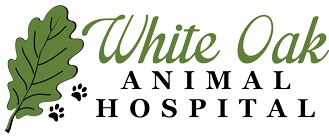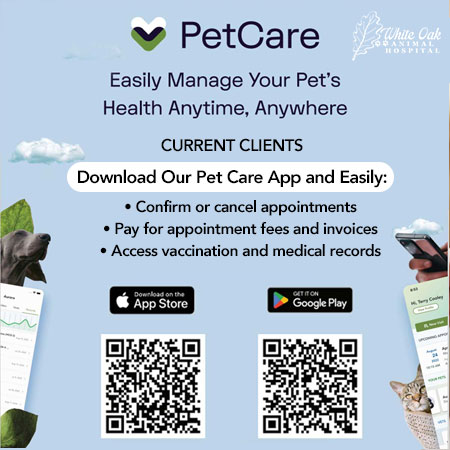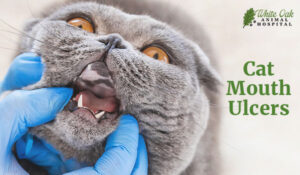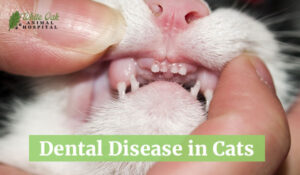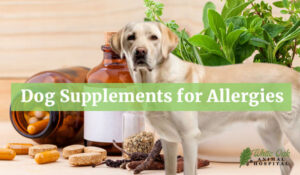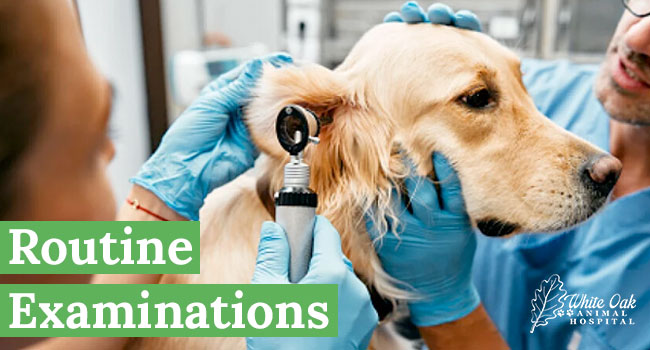
At White Oak Animal Hospital, we emphasize the significance of routine examinations in maintaining your pet’s well-being. Yearly exams are pivotal in detecting and addressing health issues early. Learn more about the importance of routine examinations, what to expect during a standard yearly vet exam, and how we provide ongoing care for chronic health problems.
Why Yearly Routine Examinations Are Important
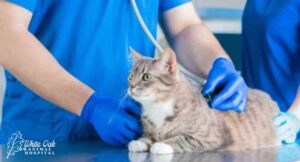 Routine examinations play a crucial role in safeguarding your pet’s health. Annual regular check-ups allow us to monitor your pet’s overall health, detect any emerging health concerns, and provide preventive care measures. By identifying potential issues early, we can intervene promptly, minimizing the risk of complications and ensuring your pet enjoys a high quality of life.
Routine examinations play a crucial role in safeguarding your pet’s health. Annual regular check-ups allow us to monitor your pet’s overall health, detect any emerging health concerns, and provide preventive care measures. By identifying potential issues early, we can intervene promptly, minimizing the risk of complications and ensuring your pet enjoys a high quality of life.
What Happens During a Yearly Routine Examination?
During a yearly routine examination at White Oak Animal Hospital, we comprehensively assess your pet’s health.
The yearly routine examination includes:
- Physical Examination: We perform a thorough physical examination to evaluate your pet’s body condition, weight, skin, coat, eyes, ears, nose, and overall appearance.
- Vaccination Review: We review your pet’s vaccination history and determine whether any vaccinations or preventive treatments are due or necessary based on its lifestyle and risk factors.
- Dental Evaluation: We assess your pet’s oral health, checking for signs of dental disease, tartar buildup, or other dental issues that may require attention.
- Diagnostic Testing: Depending on your pet’s age, health status, and risk factors, we may recommend diagnostic tests such as blood work, fecal analysis, or urine tests to screen for underlying health conditions.
- Discussion and Recommendations: We take the time to discuss our findings with you, answer any questions or concerns you may have, and provide personalized recommendations for your pet’s ongoing care, including nutrition, parasite prevention, and lifestyle modifications if necessary.
Checking Chronic Health Problems During Routine Examinations
 If your pet has chronic health problems, we revisit the health challenges during yearly routine examinations. Our veterinary team is here to provide comprehensive ongoing care and management. We work closely with you to develop a tailored treatment plan that addresses your pet’s specific needs and optimizes its quality of life. This plan may include medication management, dietary adjustments, alternative treatments, acupuncture, herbs or supplements, and regular monitoring to ensure your pet remains comfortable and healthy despite its condition.
If your pet has chronic health problems, we revisit the health challenges during yearly routine examinations. Our veterinary team is here to provide comprehensive ongoing care and management. We work closely with you to develop a tailored treatment plan that addresses your pet’s specific needs and optimizes its quality of life. This plan may include medication management, dietary adjustments, alternative treatments, acupuncture, herbs or supplements, and regular monitoring to ensure your pet remains comfortable and healthy despite its condition.
Pet Emergency Services
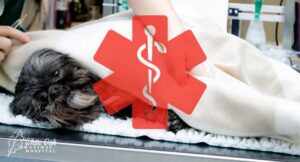 We understand that pet emergencies can be stressful and overwhelming. That’s why we offer comprehensive pet emergency services during regular business hours. If your pet experiences an emergency, please give us a call immediately. We can handle various emergencies, including trauma, illness, and sudden injuries. With our in-house surgical capabilities and hospitalization services, we can provide prompt and effective care to stabilize your pet’s condition. You can avoid unnecessary delays and receive timely assistance by contacting us first. Additionally, we strive to make emergency care affordable for pet owners, often providing the same high-quality services at a fraction of the cost of emergency animal hospitals. Your pet’s well-being is our top priority, and we’re here to help in an emergency.
We understand that pet emergencies can be stressful and overwhelming. That’s why we offer comprehensive pet emergency services during regular business hours. If your pet experiences an emergency, please give us a call immediately. We can handle various emergencies, including trauma, illness, and sudden injuries. With our in-house surgical capabilities and hospitalization services, we can provide prompt and effective care to stabilize your pet’s condition. You can avoid unnecessary delays and receive timely assistance by contacting us first. Additionally, we strive to make emergency care affordable for pet owners, often providing the same high-quality services at a fraction of the cost of emergency animal hospitals. Your pet’s well-being is our top priority, and we’re here to help in an emergency.
Schedule Your Pet’s Yearly Exam Today
Don’t wait until health problems arise. Schedule a routine examination for your pet at White Oak Animal Hospital. Our compassionate team is dedicated to promoting your pet’s health and well-being at every stage of life through proactive care. Contact us to book an appointment or to learn more about our routine examination services. Your pet’s health is our priority, and we’re here to support you every step of the way.
People Also Ask:
How does TCVM complement standard veterinary medicine during routine examinations?
TCVM, including acupuncture, herbal medicine, and food therapy, can complement standard veterinary medicine by providing alternative treatment options for various health conditions. During yearly exams, we may incorporate TCVM techniques to support your pet’s overall well-being, address specific health concerns, and enhance their quality of life.
Can I take specific preventive measures to support my pet’s health between yearly exams?
Yes, you can take several preventive measures to support your pet’s health between yearly exams. These may include providing a balanced diet, regular exercise, parasite prevention, dental care, and maintaining a safe and enriching environment at home. We can also discuss specific recommendations based on your pet’s individual needs and lifestyle.
How can alternative medicine options benefit my pet’s health during routine examinations?
Alternative medicine options such as acupuncture, herbal medicine, and chiropractic care can offer additional benefits for your pet’s health during yearly exams. These modalities can help manage pain, improve mobility, boost the immune system, and promote overall wellness. We’ll tailor our approach to meet your pet’s unique needs and preferences.
What should I do if my pet has chronic health problems that require ongoing care?
If your pet has chronic health problems, we’ll develop a customized treatment plan tailored to its specific condition and individual needs. This plan may include a combination of conventional treatments, TCVM modalities, and alternative therapies to manage symptoms, slow disease progression, and improve your pet’s quality of life. We’ll work closely with you to monitor your pet’s progress and adjust the treatment plan as needed.
How can I schedule a routine examination for my pet and discuss their healthcare needs with you?
Scheduling a yearly exam for your pet is easy! Simply contact our clinic to book an appointment at your convenience. During the exam, we’ll discuss your pet’s healthcare needs, answer any questions you may have, and collaborate on a proactive approach to ensure your pet’s continued health and well-being.
What vaccinations does my pet need during their routine examination?
During your pet’s yearly exam, we’ll review their vaccination history and recommend any necessary vaccinations based on their age, lifestyle, and risk factors. Vaccinations help protect your pet against common infectious diseases and are essential to preventive healthcare.
Can you provide nutritional advice for my pet during their routine examination?
Absolutely! Nutrition plays a vital role in your pet’s overall health and well-being. During their yearly exam, we’ll assess your pet’s diet and make dietary recommendations tailored to their needs. We’ll discuss proper feeding practices, portion control, and the importance of a balanced diet for optimal health. We can also help you learn how to cook at home for your pet or use food therapy to help with chronic conditions.
How do you approach pain management for my pet during their routine examination?
Pain management is critical to veterinary care, especially for pets with chronic conditions or age-related issues. During their yearly exam, we’ll evaluate your pet’s pain levels and develop a personalized pain management plan using a combination of medications, pain supplements, alternative therapies such as acupuncture or chiropractic care, and lifestyle modifications to improve their comfort and quality of life.
